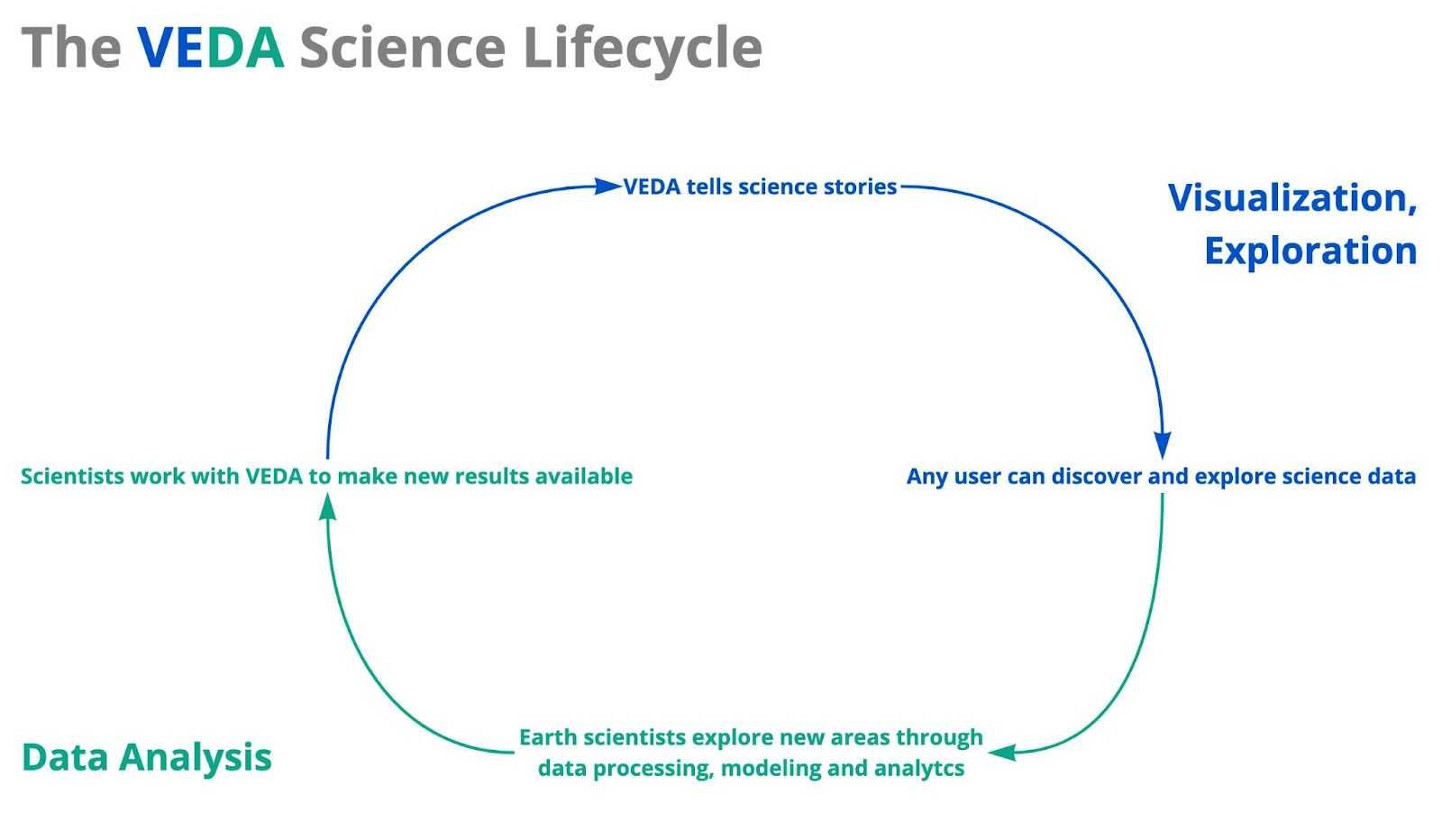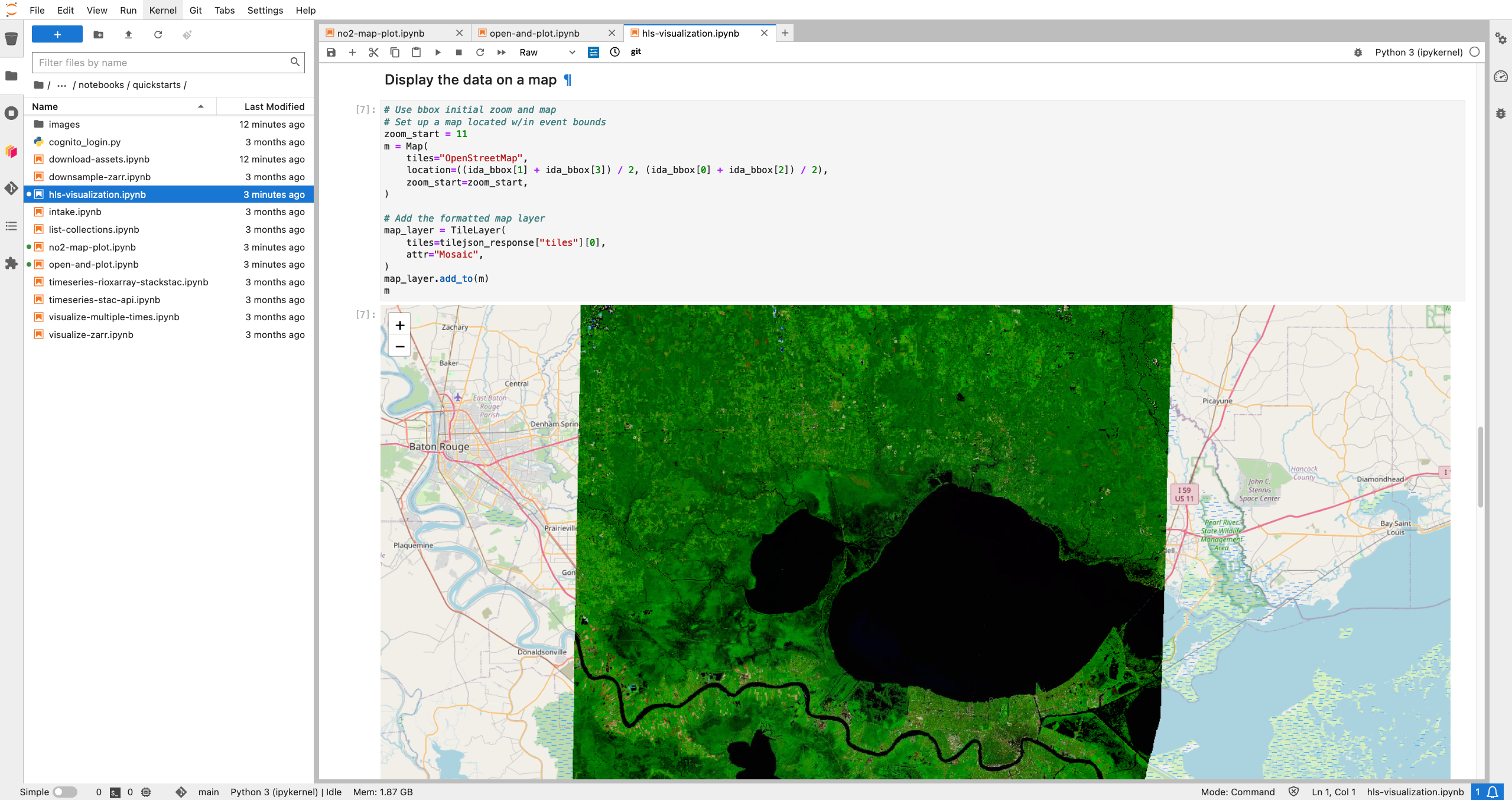NASA's Pioneering Platform for Earth Observation Data. This cloud-native, open-source platform revolutionizes open science by offering highly reusable tools in your browser for data interaction, analysis, and collaboration. Designed to meet the diverse needs of the Earth Observation community, VEDA facilitates accessible, user-friendly data exploration, enabling scientists and stakeholders to drive forward their research and missions together.
Overview
VEDA's primary goal is to accelerate open science by enabling scientists to collaborate with each other and to connect with stakeholders, all in on platform.
Challenge
NASA has vast data resources, but the data isn't always readily accessible or in user-friendly formats. The Earth Observation community needed a versatile, open-source platform that could cater to diverse user needs, from data access to analysis and sharing.
Outcome
A set of highly reusable components that, when combined, form an open-source platform for scientists and stakeholders to engage on the future of their work. These capabilities are drawing attention from other science teams eager to accelerate their own missions.
The Visualization, Exploration, and Data Analysis (VEDA) project took off in the winter of 2022, inspired by the success of the COVID-19 Dashboard: visualizing large-scale changes in environmental and economic indicators as a consequence of the COVID-19 economic and societal shutdown. Scientists at NASA were clamoring for more exploration and analysis capabilities, so Development Seed and NASA IMPACT came up with the VEDA project.
VEDA Goals
The VEDA Platform has two primary goals:
- To showcase the benefits of cloud-native data publication & access for open science, to help official data providers transition to cloud-native
- To provide a useful platform for cloud-based, collaborative open science on Earth observation data.
Our primary hypothesis for how to achieve these goals is to create a reinforcing loop that connects the work of scientists with the interests of stakeholders.

Open Science lifecycle using VEDA
Like much of the Earth Observation community, NASA has a wealth of data and talented individuals who know how to derive and share insights from this data. However, the data does not exist in accessible locations or ready-to-use formats. Off-the-shelf software provides limited solutions, and building a new platform for every use case isn’t feasible. A gap exists in the EO community for a flexible, open-source, yet powerful platform for scientists to access data, analyze that data to create new data products, and share their work with stakeholders. VEDA seeks to fill this gap with the following guiding principles are to:
- Reuse, combine, and improve existing open-source development efforts
- Develop using the latest open-source standards
- Develop reusable components that the EO community can repurpose for their use cases
Developing a Large Open-Source Product
The VEDA project is a large project involving many stakeholders, teams, and other organizations.
- We manage this complexity with a flexible, transparent agile product development approach
- We establish a flexible design and architecture from the beginning, using user research and validation to build towards value
- The team focuses on shipping software, leaning into our core value of bias to action
Because of its size, VEDA is organized into three major components: Data Services, Dashboard, and Analytics Platform.
The method for transforming, ingesting, and accessing Analysis-Ready, Cloud-Optimized (ARCO) data is the VEDA Data Services. The ARCO datasets get published to a Spatio-Temporal Asset Catalog (STAC), which is a community-driven open-source standard and enables us to leverage other community-developed tools such as TiTiler and pySTAC. Using ARCO data formats and open source tools is vital to VEDA because, once ingested, this data must be accessed by a variety of tools for many different purposes.
The VEDA Dashboard reveals the utility of the data. The dashboard lets users browse, analyze, and explore earth observation data online. This dashboard is highly configurable and is used by scientists to share their work, explore other scientists’ work, and perform basic spatial analyses.
Once a scientist decides to perform a deeper, more complex analysis, they can navigate to a JupyterHub where they can access and analyze VEDA data. This is the VEDA Analytics Platform. Over the past several years, this architecture has been prototyped, tested, and improved to ensure it is beneficial for users and stakeholders.

VEDA is an open-source project, and we welcome anybody to view or contribute to these repositories. Visit the VEDA Documentation for a list of our GitHub repositories.
Results
The VEDA project has seen success in scientists using this platform to visualize and share their work more efficiently. Additionally, more science teams are taking notice of VEDA’s capabilities and want to replicate it for their purposes. The development and adoption of open-source platforms such as VEDA are hugely powerful for the future of our planet. As the world comes to terms with the massive environmental and social challenges ahead of us, tools that allow flexible and engaging visualizations will be an important part of our collective response. Thanks to the vision and partnership from NASA IMPACT, we now have an excellent example of one such tool in VEDA.
About NASA IMPACT
NASA’s Interagency Implementation and Advanced Concepts Team (IMPACT) drives the development of the latest technologies for novel Earth data science and applications. Development Seed has partnered with IMPACT to advance its goals of enhancing data infrastructure and technology to encourage the adoption of complex Earth observation data within other federal agencies, institutions, and science users.
Have a challenging project that could use our help?
Let's connect
We'd love to hear from you.
